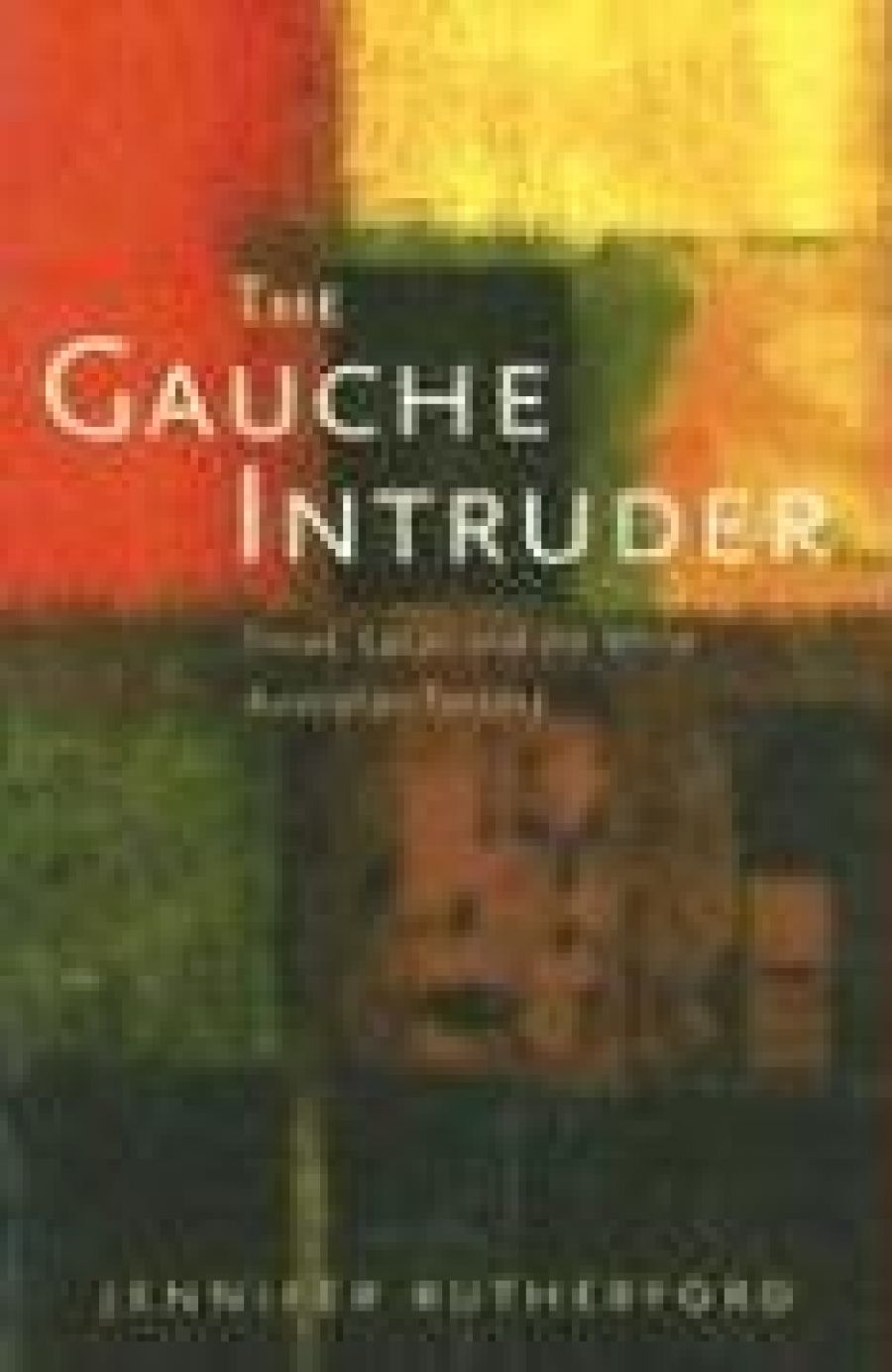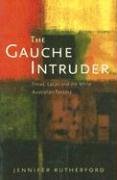
- Free Article: No
- Contents Category: Non-fiction
- Review Article: Yes
- Article Title: Puncturing the Plenitude
- Online Only: No
- Custom Highlight Text:
This Gauche intruder into the Australian book scene is sure to annoy many readers. Their annoyance, even disgust, will be various and peculiar to their own preoccupation with what they consider a good read, good literary criticism, good Australian cultural identity. Jennifer Rutherford presents us with a passionate, scholarly, rude and uncompromising discussion about Australian culture, reading identity at both individual and collective levels. She is a Lacanian (sure to annoy some), an unapologetic deployer of psychoanalytic insights into Australian identity fantasies; she is an astute and forthright literary and cultural critic (critics past and present, quake!) who offers a range of non-partisan and theoretically consistent readings of the novels of Catherine Spence, Rosa Praed, Henry Handel Richardson, George Johnston, Tim Winton, David Malouf, and Patrick White; and she is a canny, amusing, serpent-toothed reader of the broader Australian culture, from Hansonism, to the streets and suburbs of Canberra, to contemporary academia. She bites hard.
- Book 1 Title: The Gauche Intruder
- Book 1 Subtitle: Freud, Lacan and the White Australian fantasy
- Book 1 Biblio: Melbourne University Press, $32.95, 239 pp
- Book 1 Cover Small (400 x 600):

But what is her argument, and who will follow her through the challenging grids and folds of her theoretical excursus? What Rutherford argues is that White Australian culture suffers from its own fantasy of an ‘Australian Good’ – a phallic myth of plenitude, plain speech, egalitarianism, ordinariness, New World democratism – which covers an emptiness (White is close by). Rutherford argues that our culture needs to recognise this emptiness, this phallic destitution underlying the construction of plenitude. Further, she understands the ‘Australian Good’ as one version of the moral law, the symbolic structure that espouses such values as duty, fairness, the proper, but that does so by acts of surveillance, policing and suppression of desire. This policing takes a range of forms, but is, in the end, aggressive. Her further, perplexing, and richly suggestive notion, from Freud and Lacan, is that law and desire, at both individual and collective levels, are intimately connected. Rutherford’s clearest and most telling example of this connection is Hansonism and One Nation, read as part of a pervasive Australian xenophobia, a deep vein of connected ‘fantasies of the good (which) pro-vide camouflage for aggression ... directed both to an external and an internal Other’. Within this context she also considers ‘the good’ performed on the Stolen Generations, and in the assimilationist policies of the Australian Government.
The Gauche Intruder investigates the consistency of this fantasy across a wide range of literary, spatial, psychic, political and personal sites. It is this consistency that holds you riveted to her narrative – and it is a narrative, with a plot, a hero, a tragic trajectory. More of the tragic later, but first we need to acknowledge the intellectual energy of the writing; the plethora of tools constructed by Rutherford for reading and re-reading Australian fantasies of identity and place; and the bearing witness to an uncomfortable, courageous and debunking strand of Australian cultural production. Rutherford’s re-reading of Australian complacencies about what is good, neighbourly and Australian will certainly annoy many readers, even as they will not, I believe, be able to deny her forthright, ethical and scholarly readings. She is a detailed and intelligent reader of Henry Handel Richardson’s The Fortunes of Richard Mahony, for example, offering insights into both the psychic biography of the writer, and a new way of reading the representations of her parents, in the figures of Mary and Richard Mahony.
The reading of Tim Winton’s The Riders is a full, challenging and scathing account, employing a ficto-critical approach that plays on the joint name of the author and the Winton character, Jennifer. Jennifer, the absent centre of the novel, is given words by Rutherford, writing a letter back to her husband/author, exposing his use of her as absence, a hole, a lack, her being made into an urban myth, ‘through the transposition of your quilting pen, to become another telling, an Australian retelling of La Belle Dame sans Merci’. Jennifer’s Jennifer concludes her letter/critique with the avowal: ‘but yes, I did leave him. As lovers do, painfully, you could even say madly: at the other side of the world, buoyed up by my own throbbing heart that had glimpsed for a moment the possibility of its own desire ... ‘ Autobiography, analysis and fiction come together here. The critique of the character Scully, a bumbling and poignant Aussie bloke, is a masterpiece, as all the ‘good’ Australian traits of egalitarianism, innocence, openness and ordinariness have their aggressive and xenophobic underbelly exposed by the critic.
Rutherford turns to Malouf and White, as her allies, primarily, taking up again that prickly coat, the poisoned chalice of White’s ‘Great Australian Emptiness’. Around the figures of Johnno in Malouf’s novel, and the four illuminati of Himmelfarb, Miss Hare, Dubbo and Mrs Godbold in White’s Riders in the Chariot, Rutherford offers nuanced and persuasively detailed readings. Her central argument values in these figures a cultural production that does not seek cover in a myth of plenitude, or redemptive assurance, but that circles painfully around lack. Through these ‘Others’ of Australian culture, excoriated, hated, finally purged from their fictional Australian worlds in death or alienation, Rutherford leads us to contemplate ‘the Thing’, that place of the gauche intruder, the Other beyond simple signification, between deaths, the place where we cannot speak and do not know, the ‘recognition of our subjective destitution; of the loss that is ours by virtue of our humanity – our language’.
And this is the place from which the tragic voice of The Gauche Intruder emerges. As Rutherford writes her theoretical, writerly, psychoanalytic Australian narrative, she enjoins her readers to consider an ethics learned from Lacan:
It is to listen with both an ear to the unconscious and an ear to the Other. Otherness which has been so unfathomable and so unheard in the history of white Australia is what we must learn to hear on the far side of the Australian Good.
It is not a comforting ethics. It involves a puncturing of our sense of plenitude, both individual and collective; a recognition that being in language is being subject to loss, without ‘fantasies of cultural redemption’. If we accept the Lacanian framework, we need to see that even in our most moral ideals we are subject to, and the agents of, aggression, sordidness and destitution. But at the same time, this is an ethics that requires a seeking of ‘full speech’, ‘a speech which refuses to be waylaid in the defiles of fashionable discourse. Speech, in short, which keeps its end in view.’ As much as anyone, Rutherford knows that a prophet is not welcome in her own country, but I think she’s well equipped for the consequences of her prophetic stance.
I hope this book finds many readers who are willing to contemplate its subtle, engaged and often painful understandings.


Comments powered by CComment